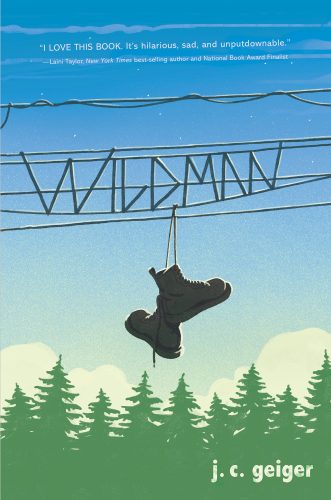
The premise is strictly film noir: Returning from a road trip to Seattle, a high school valedictorian from Oregon — an all-American kid, first-chair trumpet player, a bit tightly wound but, you know, going places — suddenly breaks down in rural Washington, his ’93 Buick reduced to a hunk of immobile metal.
Now, instead of making it home to a graduation party where he plans on losing his virginity with his longtime girlfriend, Lance Hendricks is stranded in the middle of nowhere, surrounded by a small-town cast of drinkers, dreamers and deadbeats.
He checks into a motel. He witnesses a car wreck and saves a life. And in the space of a few days, Lance is plunged into something so unfamiliar that he is forced to confront, and perhaps alter forever, the trajectory of his buttoned-up middle-class life.
This, then, is the trajectory of Wildman, the excellent debut novel by Eugene author Jeff Geiger (writing as J.C. Geiger). It is a coming-of-age story, indeed, but it reads with all the compulsive curiosity of a crime thriller, and the suspense is distinctly existential and romantic. The novel is propulsive in a way that is un-put-downable, and its naturalism and immediacy hide depths of feeling that surge just below the surface.
Geiger is, for lack of a better term, an action writer. Wildman is driven along, blow-by-blow, on the strength of its narrative, and the world is rendered in all its physicality as a very real place occupied by very real bodies in motion and at rest. As Lance is pulled along, seemingly helplessly at first, by the forces of fate, the book itself gathers a breathless quality — a fleetness that somehow enhances the human drama that sizzles through the pages.
So, yes, there’s action aplenty, in every sense of the word, but it would be a mistake to peg Wildman as merely a rippin’ good adventure yarn. Woven seamlessly into the solid architecture of Geiger’s writing is a rare and poetic tenderness of feeling; his characters are not mere stand-ins for types but fully realized beings, containing hidden universes of hurt, love and compassion that burst forth unexpectedly in moments of painful truth.
At the core of Wildman is the romantic tension that develops between Lance and Dakota, an eccentric local girl whose hidden artistic leanings reveal a soul strangled by the low ambitions and stillborn dreams of her peers. Erotic intrigue might be one of the most difficult things to render with any kind of authenticity, especially of the teenage variety, but Geiger does an incredible job of transmitting the vulnerability, fear, exhilaration and the messy, outsized emotions of two kids reluctantly drawn together.
The individual portraits of the locals Lance gets mixed up with — an incestuous population of barflies, mechanics, kooks, fighters, saints and sinners — are equally nimble and compassionate. Geiger, to his everlasting credit, never falls back on podunk truisms or cheap caricature, but rather reveals the deep humanity of each character, the beating heart that moves him or her along. Each one is indelible and lovable, faults and all.
The impact each of these characters has on Lance is like a chink in the armor of his protected existence. Throughout the book he repeats the same words over and over to himself, like a mantra against the threat of chaos: “You are valedictorian. You are the first-chair trumpet player. You have a full-ride scholarship. Miriam Seavers is in love with you.”
And the more Lance gets tangled up in the everyday fears and failures and hopes and strangled victories of life on the other side of the tracks, the more his suburbanite mantra sounds like a lame excuse to avoid the real world, until the tension becomes unbearable. Geiger captures this anxious borderland of a young man suddenly plunged into the real world with grace, humor and a sense of hard-won optimism.
Wildman is a young adult novel, but its appeal is universal. Reading it, I was plunged back into recollections of my own teenage years, with their heightened and slightly scary sense of possibility, but I was also confronted with the everyday static we all face in life — and how fear of the unknown pushes against our deepest desires for change.
Geiger’s novel gives full voice to the risks, pitfalls and rewards of becoming who we truly are. In this sense, Wildman is as much about becoming an artist as it is about becoming an adult, a creator of one’s own existence. And it’s a heady, wild ride.